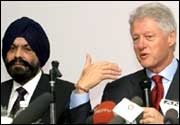 Juggling figures, deploying his sharp wit and memory, and rarely giving a glimpse of his legendary charm, former US President Bill Clinton on Friday launched a major medical initiative to make available Anti-Retroviral Drugs to millions affected by HIV/AIDS around the world at almost one-third of the existing market costs.
Juggling figures, deploying his sharp wit and memory, and rarely giving a glimpse of his legendary charm, former US President Bill Clinton on Friday launched a major medical initiative to make available Anti-Retroviral Drugs to millions affected by HIV/AIDS around the world at almost one-third of the existing market costs.
Clinton was back in New Delhi, which was spellbound during his 2000 summer's historic tour that thoroughly changed the course of Indo-US relations, to announce an agreement between the Clinton Foundation and four leading pharmaceutical companies -- Ranbaxy, Cipla, and Matrix from India and the South African Aspen Pharmacare Holdings.
Clinton said the arrangement would bring down the cost of a triple drug therapy combination to about $139 from the existing market price of $500.
The former US president painted the horrors of the deadly disease around the world. Clinton's sharp memory and oratory skills were evident as he juggled facts and figures to convey how out of six million who need medicine, only 300,000 get the medication. Of these, almost one-third are in Brazil.
He said the dimensions of the disease are quite significant. "Over 890,000 school children lost their teachers" in South Africa to AIDS, he pointed out. Clinton expressed sorrow over so many young people losing life to HIV, saying the death of an HIV positive friend in the mid-80s changed his life forever.
In his new avatar as the agent of the deprived, Clinton was in China for an important conference on AIDS.
In New Delhi, he is meeting Prime Minister Atal Bihari Vajpayee and several representatives of the government.
He said the present agreement aims to make available the ARVs to some two million people around the world in the next four to five years.
Under the existing programme of the Clinton Foundation, the low-cost drugs will go to South Africa, Rwanda, Mozambique, Tanzania, Haiti, The Bahamas, the Dominican Republic, and the Eastern Caribbean States.
During an interaction, it was pointed out that India was home to world's second largest population of HIV cases, but the drugs are being sourced from Indian companies for foreign nations.
Clinton said he is trying to work with the Indian government during his present visit to find some ways to do the same for Indian patients, but he had no concrete answer.
"I am sure all these companies would like to treat all HIV people in India," Clinton said.
Under the agreement announced on Friday, Clinton Foundation has negotiated with the countries concerned for a regular supply of the drugs at a reduced cost.
An assured demand has made the business a "low price, high volume" one from the earlier "high price, low volume" one, Clinton said.
Clinton was at his eloquent best as he spoke about the way HIV had changed his responses and attitude towards life.
His father died when he was 29 and so after himself crossing 29, Clinton thought "I would have a long life."
"When someone younger than me dies, when all these children, young people, young teachers are dying It is bad for the future of freedom," Clinton said.




